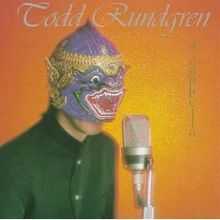A Cappella (Todd Rundgren album)
| A Cappella | ||||
|---|---|---|---|---|
 | ||||
| Studio album by Todd Rundgren | ||||
| Released | September 1985 | |||
| Recorded | at Utopia Sound | |||
| Genre | Pop rock | |||
| Length | 39:42 | |||
| Label | Warner Bros./Rhino | |||
| Producer | Todd Rundgren | |||
| Todd Rundgren chronology | ||||
| ||||
| Singles from A Cappella | ||||
|
||||
| Professional ratings | |
|---|---|
| Review scores | |
| Source | Rating |
| allmusic | |
| Rolling Stone | (Not rated)[2] |
A Cappella is a 1985 album by Todd Rundgren. The album is one of Rundgren's most unusual in that every sound is the product of the artist's voice. Rundgren employed overdubbing techniques and an E-mu Emulator (an early sampler), electronically manipulating the sound of his voice in order to mimic conventional rock instruments, handclaps, and other sounds.[3] This unique approach to music making was later explored by artists such as Mike Patton and Björk.
A Cappella was finished in 1984 and slated for release on Bearsville Records later that year but with Bearsville's slimming artist roster and lack of successful artists Bearsville didn't want to take a chance releasing something they felt was too experimental and wouldn't sell so A Cappella was shelved. The label filed for Bankruptcy in 1985 and all remaining Bearsville releases were released by Warner Bros or dropped completely.
A test pressing of the LP was bootlegged under the title "Runt A Cappella"(CATSVILLE TR-084) and may have influenced Warner Bros to release the album since bootleggers were profiting from it. This same bootleg was also released as a high quality concert recording of an A Capella live concert, taken from a recording at the Bismark Theater, October 25 1985 that was broadcast via the King Biscuit Flower Hour. The packaging of both bootlegs were the same so it wasn't known whether it was the studio LP or live LP until it was played.
This album would also be Rundgren's first official album for Warner Bros. Records, following the demise of Bearsville Records, which Warner Bros. distributed. Rhino Records would take over the rights to the album for release on CD and for online distribution.
Track listing
All songs written by Todd Rundgren, except where indicated.
- Side one
- "Blue Orpheus" – 5:02
- "Johnee Jingo" – 3:51
- "Pretending to Care" – 3:40
- "Hodja" – 3:25
- "Lost Horizon" – 4:57
- Side two
- "Something to Fall Back On" – 4:13
- "Miracle in the Bazaar" – 4:12
- "Lockjaw" – 4:01
- "Honest Work" – 2:40
- "Mighty Love" (Hawes, Jefferson, Simmons) – 3:41
Charts
Album
| Year | Chart | Position |
|---|---|---|
| 1985 | US Billboard Pop Albums[4] | 128 |
Cover versions
American singer Jennifer Warnes covered "Pretending to Care" on her 1992 album The Hunter, which reached #13 on the Billboard Adult Contemporary chart. The song was also covered by Australian singer Daryl Braithwaite on his 1988 album Edge. Both featured traditional instrumentation. Singer (and Manhattan Transfer member) Janis Siegel also recorded the song for her 1989 album Short Stories, a collaboration with pianist Fred Hersch.
Guitarist Paul Gilbert covered "Blue Orpheus" on his 2010 album "Fuzz Universe".
"Honest Work" has been covered by several Irish vocal acts, including Beyond the Pale, Cloudstreet, Pat Sheridan, and Maddy Prior.
References
- ↑ Allmusic review
- ↑ Rolling Stone review
- ↑ Kopp, Bill. "Todd Rundgren" (HTML). Trouser Press. Trouser Press LLC. Archived from the original on 4 August 2007. Retrieved 2007-07-25.
- ↑ "allmusic ((( Todd Rundgren > Charts & Awards > Billboard Albums )))". Billboard. Retrieved 2012-04-27.